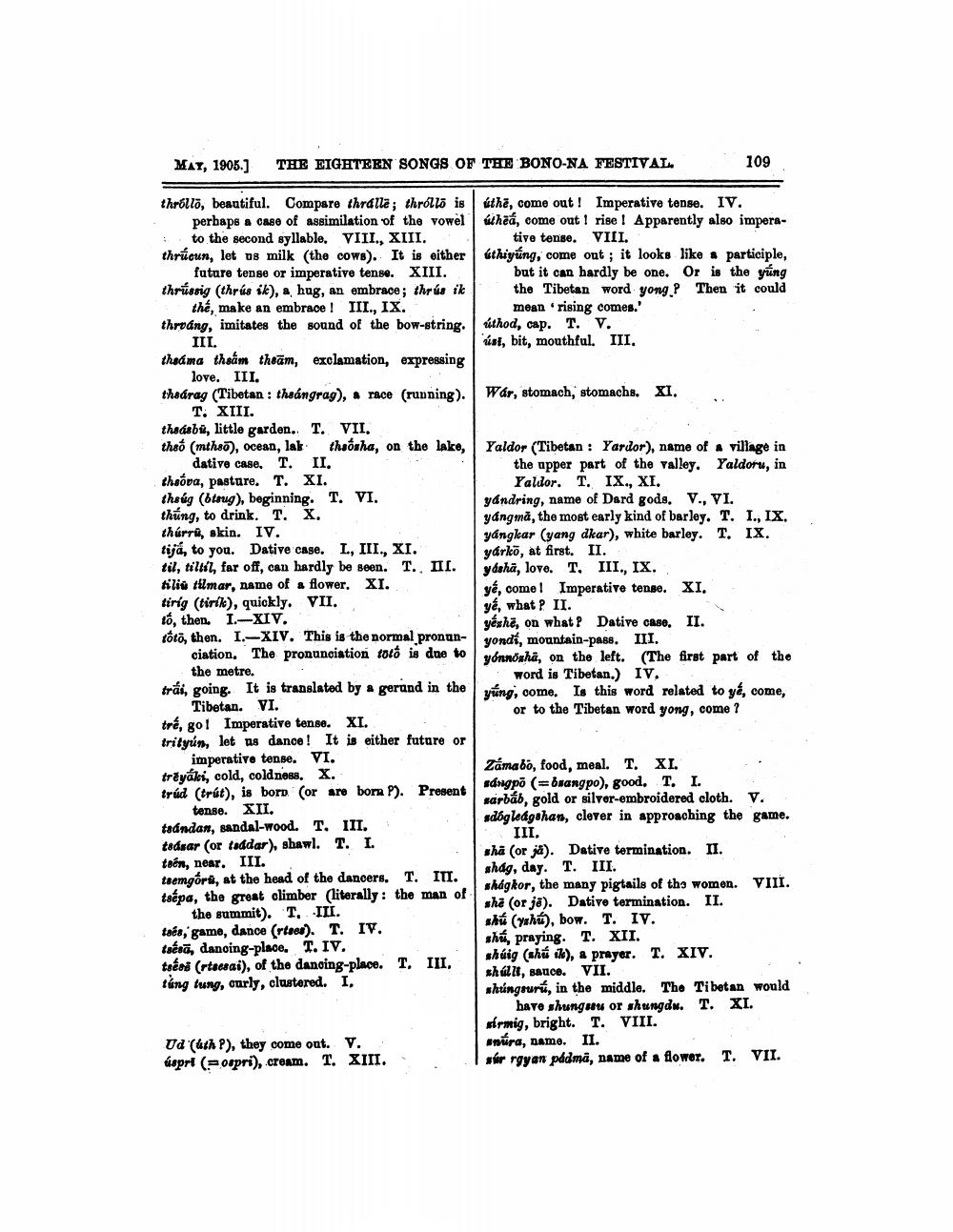________________
MAT, 1905.]
THE EIGHTEEN SONGS OF THE BONO-NA FESTIVAL
109
throllo, beautiful. Compare thralle; throllo is áthë, come out ! Imperative tense. IV.
perhaps a case of assimilation of the vowel üheá, come out ! rise ! Apparently also imperato the second syllable, VIII., XIII.
tive tense. VIII. thrúcun, let us milk (the cows). It is either úthiyung, come out ; it looks like a participle, future tense or imperative tense. XIII.
but it can hardly be one. Or is the yung thrússig (thrús ik), a hug, an embrace; thrús ik the Tibetan word yong? Then it could thé, make an embrace ! III., IX.
mean rising comes.' throáng, imitates the sound of the bow-string. úthod, cap. T. V. IIL.
úst, bit, mouthful. III. thoáma thsám thoām, exclamation, expressing
love. III. thedrag (Tibetan: thoángras), o race (running). Wár, stomach, stomachs. XI.
T. XIII. thedabu, little garden. T. VII. theo (mths), ocean, lak thaosha, on the lake, Yaldor (Tibetan : Yardor), name of a village in dative case. T. II.
the upper part of the valley. Yaldoru, in thaova, pasture. T. XI.
Yaldor. T. IX., XI. thsúg (btrug), beginning. T. VI.
yándring, name of Dard gods. V., VI. tháng, to drink. T. X.
yangmā, the most early kind of barley, T. I., IX. thúrrü, skin. IV.
yangkar yang dkar), white barley. T. IX. tijá, to you. Dative cage. L., III., XI.
yárko, at first. II. til, tilti, far off, can hardly be seen. T., III. yoshā, love. T. III., IX. tilin tilmar, name of a flower. XI.
yé, come! Imperative tense. XI. tirig (tirik), quickly. VII.
yé, what ? II. to, then. I.-XIV.
yéshë, on what? Dative case. II. tốto, then. I.-XIV. This is the normal pronan
yondí, mountain-pass. III. ciation. The pronunciation toto is due to yónnonha, on the left. (The first part of the the metre.
word is Tibetan.) IV. trái, going. It is translated by a gerund in the yúng, come. Is this word related to yé, come, Tibetan. VI.
I or to the Tibetan word yong, come ? tré, go! Imperative tense. XI. trityun, let us dance! It is either future or imperative tense. VI.
Zámabo, food, meal. T. XI. trèyáki, cold, coldness. X. trúd (trút), is boro (or are born P). Present
sángpo (=buangpo), good. T. L.
warbáb, gold or silver-embroidered cloth. V. tense. XII.
sdógledgshan, clever in approaching the game. toándan, sandal-wood. T. III.
III. tadsar (or teddar), shawl. T. I.
sha (or ja). Dative termination. II. taén, near. III. A
shag, day. tsemgóra, at the head of the dancers. T. ITI.
T. III. taépa, the great climber (literally: the man of
shágkor, the many pigtails of the women. VIII.
sha (or ja). Dative termination. II. the summit). T. III. tals, game, dance (rtres). T. IV.
shú (yhú), bow. T. IV.
shi, praying. T. IV.
T. XII. isésā, dancing-place.
shúig (shú ik), a prayer. III.
T. XIV. tréni (rtacsai), of the dancing-place. T.
shúla, sauce. VII. táng lung, curly, clustered. I,
shúngsurú, in the middle. The Tibetan would
have shunguu or shungdu. T. XI.
pirmig, bright. T. VIII. Ud (uth P), they come out. y.
snúra, name. II. úsprl (= ospri), cream. T. XIII.
súr rgyan pádma, name of a flower. T. VII.




